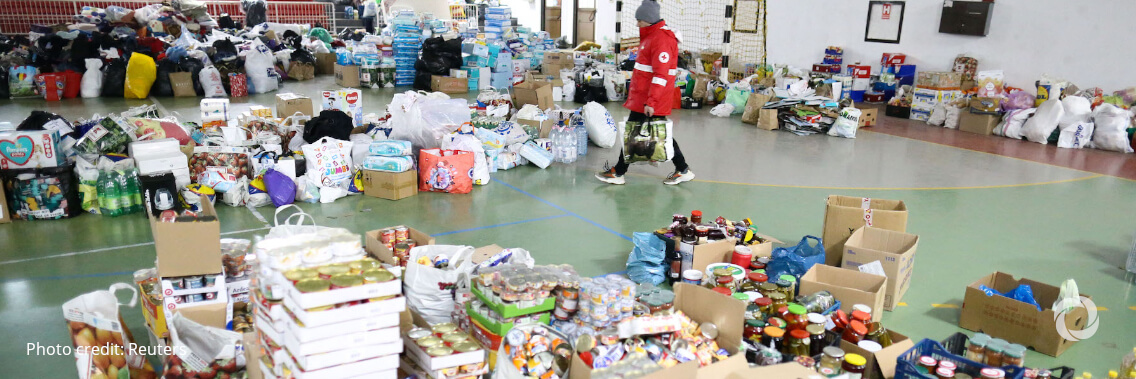Since February 24th, over 4 million Ukrainians have fled their homes, with many crossing the borders into neighboring countries, including Poland, Romania, Hungary, and Moldova. Two-thirds of these people are women and children, and even those who had family or friends in neighboring countries to stay with faced leaving their beloved and hard-earned belongings behind, leaving home with just a backpack of necessities. Others fled without connections, guaranteed refuge or resources, and face an uncertain future.
But it’s not just the millions that have fled Ukraine who has been affected by this conflict. UNCHR data estimates that 6.5 million people have been displaced inside Ukraine itself, although it may be closer to 8 million. While they have not left the country, these people have been forced to leave their homes, towns, cities, and families and may not know if they can ever return.
Concern’s response
On February 28th, Concern deployed an emergency response team to Poland to conduct an initial assessment to determine the response. There CW saw the influx of Ukrainians across the border, with people boarding buses to venture further into Poland or into Europe. The organization also completed vital assessments in Moldova, Hungary, Slovakia, and Romania. As a result of these assessments, CW determined that the need is greatest inside Ukraine and is focusing its efforts here.
The organization is doing this by working with the Alliance2015 partners and using funds from the extremely generous donations from the donors and the public around the world to meet the needs of Ukrainians affected by this conflict.
What is Alliance2015?
Alliance2015 was founded in 2000 to work towards achieving the Sustainable Development Goals and is a network of seven European NGOs. Concern Worldwide works alongside ACTED (France), Ayuda en Accion (Spain), Cesvi (Italy), HELVETAS (Switzerland), People in Need (Czech Republic), and Welthungerhilfe (Germany) to respond to humanitarian crises and work towards eradicating poverty.
While Concern has experience in dealing with refugee crises worldwide, including the crisis in Kosovo and Albania in 1999, before the conflict in Ukraine, did not have a presence here. However, two of the Alliance2015 partners, ACTED and People in Need (PiN), have worked in Ukraine since 2014 and have well-established relationships with local authorities and NGOs. Therefore, Concern supports ACTED and PiN as they deliver a 12-month intervention in Ukraine.
The program in Ukraine
The intervention consists of three main activities, which will help Ukrainians who remain in Ukraine with rent, food, hygiene, and psychosocial support.
Kits
Concern and theAlliance2015 partners aim to provide:
- 8,000 NFI (non-food item) kits, including bed linens, pillows, blankets, cutlery, tableware, a kitchen knife, a cooking pot, and a teapot.
- 5,000 household and institutional hygiene kits, including soap, washing powder, toilet brushes, rubber gloves, paper towels, and hand sanitizer.
- 200 baby hygiene kits, including diapers, soap bars, baby wipes, baby powder, and moisture cream.
They are also establishing smaller satellite warehouses to complement established warehouses in Rzeszow in Poland, and Lviv and Chernivtsi in Ukraine, to deliver aid directly to areas affected by the conflict.
Cash
In crises like this, cash-based programs are essential in helping people afford rent and other necessities. ACTED and PiN, who has extensive experience in delivering cash-based programs in Ukraine, plan to work through the Ukrainian postal service and the State Savings Bank of Ukraine, which are operational in western and central Ukraine, to deliver cash to those who need it.
This plan involves:
- Multi-purpose cash assistance: Approximately $78 per person for a month for 10,000 people.
- Cash for rent: Approximately $60 per person per month for 5,000 people.
Collective Centers
While many Ukrainians had places to go as they fled either their home or their country, many of the displaced do not have these connections. Therefore, this intervention includes collective centers – a communal center to offer accommodation and WASH facilities to IDPs (internally displaced persons).
This activity involves:
- The rehabilitation of nine collective centers, including heating systems, kitchen equipment, washing machines, bedding, WASH facilities, and the separation of sleeping areas to ensure that residents’ basic privacy requirements can be met.
- Installing information desks at each center so residents can access information on their rights, services available to them, and onward movement and settlement.
- The provision of hot meals at not only collective centers but train and bus stations and border crossings.
- Providing psychosocial support to residents of the centers, and psychological first aid training to parents, to help them provide support to their children in a time of great distress.
See also: 🔴 LIVE UPDATES | Humanitarian response to Ukraine crisis

